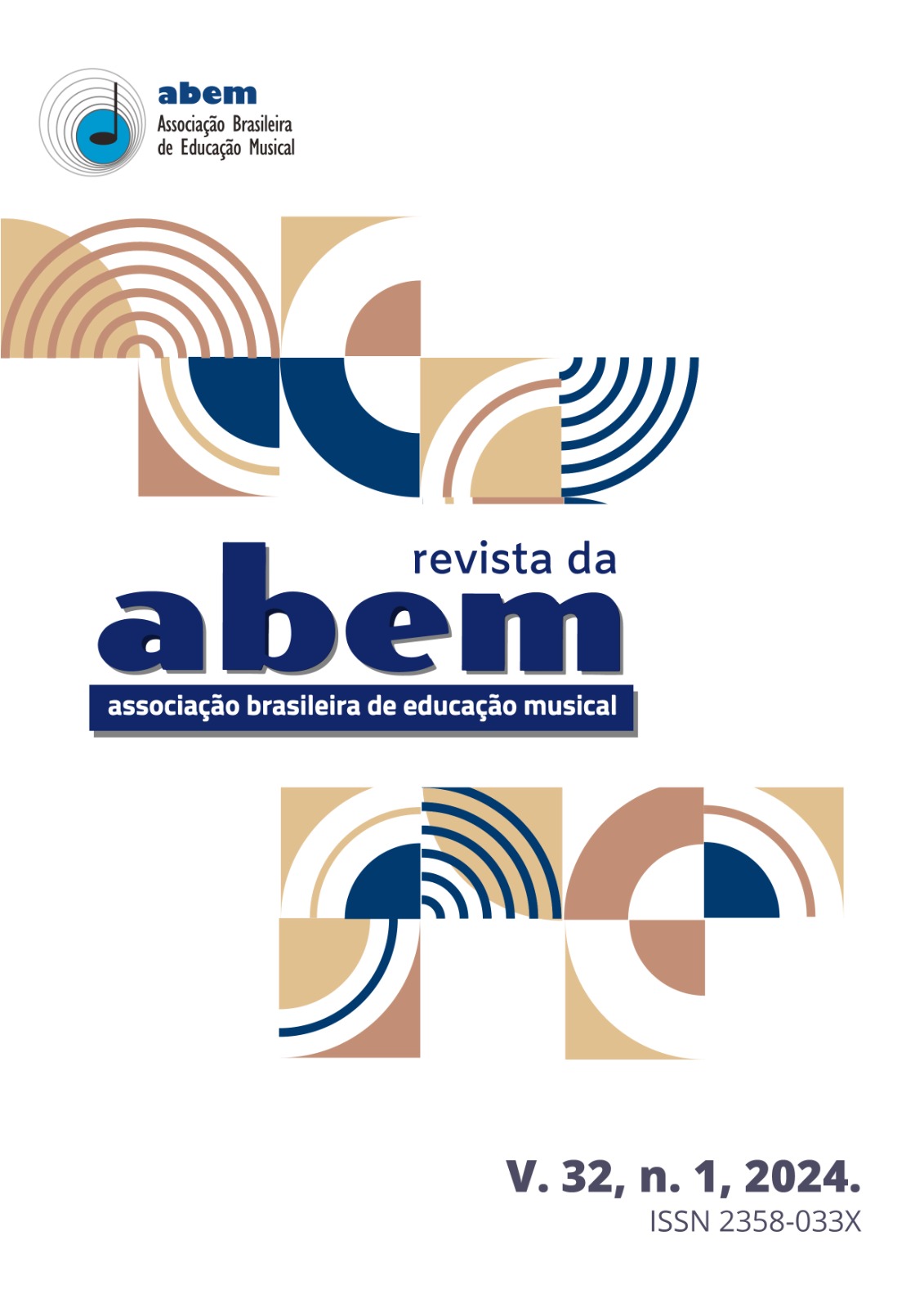40 Years of the Suzuki Piano School in Brazil
DOI:
https://doi.org/10.33054/ABEM202432108Keywords:
Suzuki Piano School in Brazil; Talent Education; Piano Pedagogy; Musical Education.Abstract
This paper discusses the arrival and expansion of the Suzuki Piano School (SPS) in Brazil. To this end, research was carried out on the topic, in which data were collected in semi-structured interviews, data provided by the Suzuki Association of the Americas (SAA) and by course organizers in Brazil. It was found that 2022 marks 40 years since the arrival of the SPS in Brazil. The first experiences of applying SPS in Brazil began in 1982 through the work of piano teacher Maria Elena Withers Pessoa. The importance of the International Suzuki Festival in Peru for the training of Brazilian teachers was noted, especially when the provision of courses was rare in Brazil. The third, and most recent, expansion phase of the SPS has been taking place since 2016, as a result of the recurring visit to Brazil by Peruvian teacher trainer Flor Canelo. The research data also indicates that the Suzuki Piano Community is growing in Brazil, but there is still room for expansion, as the majority of teachers are concentrated in the South and Southeast regions, having only completed the first stage of training. Finally, the data highlighted the impacts of the COVID-19 pandemic on the modality and intensity of SPS course offerings in Brazil, motivating the creation of other types of Suzuki events and integrating Suzuki teachers and students from different Brazilian regions.
Downloads
References
ALVIM, Izabela da Cunha Pavan. Perspectivas sobre o ensino-aprendizagem do piano pelo Método Suzuki no Brasil. 2022. 295 f. Tese (Doutorado em Música) – Programa de Pós-Graduação em Música, Universidade Federal de Minas Gerais, 2022.
BAUMAN, Susan C. In Search of The Japanese Spirit in Talent Education: A Research Essay. USA: Summy-Birchard Music, 1994.
BIGLER, Carole; LLOYD-WATTS, Valery. Studying Suzuki Piano: More Than Music. 2ed. Los Angeles: Summy-Birchard Music, 1998.
CAMPOS, Regina Maria Grossi. Conservatórios Musicais de Londrina: um estudo em história da educação (1930-1965). 2009. 265 f. Dissertação(Mestrado em Educação) - Centro de Educação, Comunicação e Artes, Universidade Estadual de Londrina, Londrina, 2009.
FRASER, Caroline. Latin American Update. In: SUZUKI ASSOCIATION OF THE AMERICAS. American Suzuki Journal. v. 29, n. 2, p. 52-54, 2001.
GERLING, Fredi. Suzuki: o ‘método’ e o ‘mito’. Em Pauta, Porto Alegre, v. 1, n. 1, p. 47-56, 1989.
ILARI, Beatriz. Shinichi Suzuki: a educação do talento. In: MATEIRO, Teresa; ILARI, Beatriz (eds.). Pedagogias em Educação Musical. Curitiba: InterSaberes, 2012. p. 185–218.
LANDERS, Ray. The Talent Education School of Shinichi Suzuki: An Analysis: Application of Its Philosophy and Methods to All Areas of Instruction. 4 ed. Princeton: Daniel Press, 1987.
LUZ, Cleci Cielo Guerra Guedes da. Violinistas e método Suzuki: um estudo com egressos do Centro Suzuki de Santa Maria. 2004. 47 f. Dissertação (Mestrado em Música) – Instituto de Artes, Universidade Federal do Rio Grande do Sul, Porto Alegre, 2004.
PENNA, Marco Antonio. Método Suzuki em Santa Maria. Santa Maria, UFSM, 1998.
PONTES, Samuel Campos de. Diversas lentes de leitura do Método Suzuki: diálogos e outras experiências literárias. 2017. 109 f. Dissertação (Mestrado em Música) – Programa de Pós-Graduação em Música, Universidade Estadual Paulista, São Paulo, 2017.
SAITO, Shinobu. History and Development of The Suzuki Method in Brazil. 1997. 196 f. Essay (Doctor of Musical Arts) - Graduate College, University of Iowa, Iowa City, 1997.
SUZUKI, Shinichi. How to teach Suzuki Piano. Los Angeles: Summy-Birchard Music, 1993.
SUZUKI, Shin’ichi. Nurtured by Love. 3rd ed. Los Angeles: Alfred Music, 2012. SUZUKI, Shizuko. The beginnings of the Suzuki Piano Method. International
Suzuki Journal, vol. 5, no. 2, p. 8-9, 1994.
TEIXEIRA, Maria Ignês Scavone de Mello. Estrelinhas Brasileiras. Volume 1.
Curitiba: UFPR, 2016.
TEIXEIRA, Maria Ignês Scavone de Mello. Estrelinhas Brasileiras: como ensinar a tocar piano de modo lúdico usando peças de autores brasileiros. Volume 2. Curitiba: UFPR, 2014.
VIEIRA, Carlos Alberto Angioletti. O Método Suzuki no Brasil: 1973 a 1989, os primeiros anos. 2010. Disponível em: http://ensinosuzuki.blogspot.com/2010/03/educacao-e-amor-dr.html. Acesso em 19 jan. 2022.
YOSHIMOTO, Ester Yurie. Metodologia Suzuki de Piano no Brasil: contextualização e estratégias para sua aplicação. 2021. 67 f. Trabalho de Conclusão de Curso (Bacharelado em Música) - Escola de Comunicações e Artes, Universidade de São Paulo, São Paulo, 2021.
Downloads
Published
How to Cite
Issue
Section
License
Os(As) autores(as) que tiver(em) seu texto manuscrito aprovado deverá(ão) enviar à Editoria da REVISTA uma Carta de Cessão (modelo enviado no ato do aceite), cedendo os direitos autorais para publicação, em regime de exclusividade e originalidade do texto, pelo período de 2 (dois) anos, contados a partir da data de publicação da REVISTA.
DECLARAÇÃO DE ORIGINALIDADE E EXCLUSIVIDADE DE CESSÃO DE DIREITOS AUTORAIS
Declaramos que os artigos presentes na REVISTA DA ABEM são originais e não foram submetidos à publicação em qualquer outro periódico nacional ou internacional, quer seja em parte ou na íntegra. Declaramos, ainda, que, após um artigo ser publicado pela REVISTA DA ABEM, ele não poderá ser submetido a outra forma de publicação, no prazo de dois anos. Passado esse período, a REVISTA DA ABEM cede direitos aos(às) autores(as) para publicarem o texto em livros ou outro periódico, desde que haja autorização do Conselho Editorial.
Também temos ciência que a submissão dos originais à REVISTA DA ABEM implica transferência dos direitos autorais da publicação digital e, a não observância desse compromisso submeterá o(a) infrator(a) a sanções e penas previstas na Lei de Proteção dos Direitos Autorais (nº 9610, de 19/02/98).


